Stunning collections of Hamamelis (witch hazel), Amelanchier and Eucalyptus held at the National Memorial Arboretum and Ventnor Botanic Gardens, have now been secured for the future
Three nationally important collections of Hamamelis (witch hazel), Amelanchier (snowy mespilus) and Eucalyptus trees have been accredited as National Plant Collections.
The beautiful witch hazel and Amelanchier collections are held at the National Memorial Arboretum in Staffordshire and the scientifically significant collection of Eucalyptus trees can be found at Ventnor Botanic Gardens on the Isle of Wight. All three collections – which together comprise an impressive 434 trees – are now protected for the future and will continue their vital role in helping mitigate against the challenges of climate change and encouraging wider biodiversity at both sites.
All three tree collections will be celebrated throughout National Tree Week (23rd November – 1st December 2024) by Plant Heritage, the National Memorial Arboretum and Ventnor Botanic Gardens.
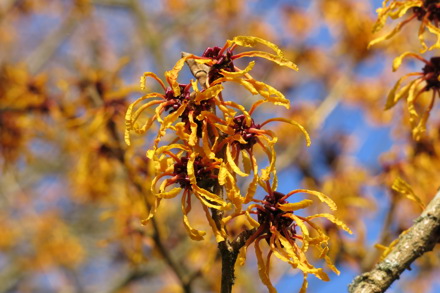
Hamamelis x intermedia 'Orange Peel'
Plant Heritage (GG)
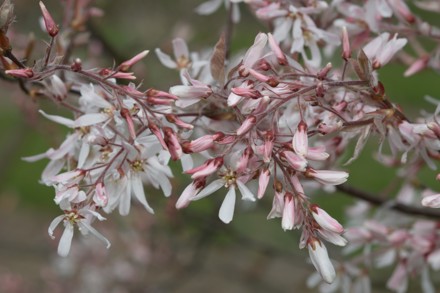
Amelanchier 'La Paloma'
Chris Lane
The National Memorial Arboretum is home to approximately 25,000 trees including 262 Hamamelis (witch hazel) to inject stunning winter colour into the grounds and 102 Amelanchier, whose striking late autumnal golden, orange and red hues bathe the site in golden light. The arboretum has worked exclusively with Collection Holder and expert Chris Lane, who has propagated his own collections in Kent to supply the arboretum with duplicates of both varieties. This not only increases the numbers of both trees but also acts as a crucial back-up to further protect both varieties, should anything ever happen to Chris’ collections. This forward planning is key to the longevity of different tree and plant collections and is widely encouraged by Plant Heritage as part of the charity’s ongoing conservation work. These collections are found within the free-to-enter 150-acre arboretum where they stand alongside more than 420 memorials to members of the Armed Forces, Emergency Services, and civilian services, including the iconic Armed Forces Memorial.
Further south, Ventnor Botanic Garden’s newly accredited Eucalyptus collection is part of nationally important trial designed in the 1970s to test the limits of existing trees’ hardiness and introduce new species to the site. The outcomes from this trial will increase current understanding about how climate change is affecting various trees and plants, and how gardens might respond in the future. Consequently, most of Ventnor’s Eucalyptus trees are now regarded as county or national champions on the Tree Register, as a mark of their responsiveness to a warming climate and their significance as indicators of change.
Gwen Hines, CEO of Plant Heritage, said: “Both the National Memorial Arboretum and Ventnor Botanic Gardens are sites of historical and national importance, meaning all three collections will be available for everyone to visit, in all seasons, in perpetuity. Also, the fact that both sites will always have a dedicated team caring for these special trees is fundamental, as this will ensure their long-term survival. Knowing that the future of these collections is now secured is a real triumph for our ongoing plant conservation work.”
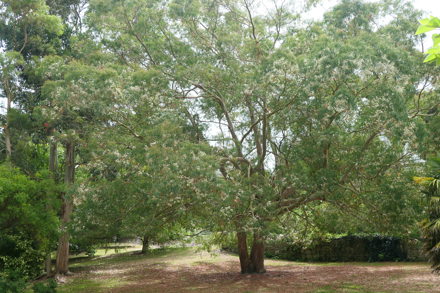
Eucalyptus amygdalina in flower
Ventnor Botanic Gardens
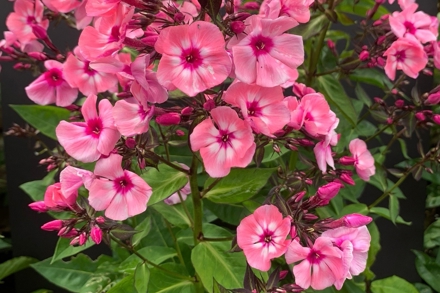
Phlox paniculata 'Larissa'
Edwina Miller
Plant Heritage has also accredited a further nine National Plant Collections this autumn, including:
Over 500 garden phlox (Phlox paniculata) held on a working farm in the Forest of Bowland, Lancashire. This colourful collection boasts an exquisite scent and a kaleidoscope of colours in the summer.
- A pretty and perfumed collection of tea roses, which aims to revive the popularity of this once widespread variety. Also located on an arable farm, it is part of an impressive 600-cultivar strong rose collection in Suffolk. Much like Ventnor’s Eucalyptus collection, these tea roses are perfectly adapted to a warming climate.
- An extensive collection of over 94 species of Anguloa and Masdevallia orchids, now cared for by The Mathers Foundation in Sussex. The Anguloa collection was previously held by Richard and Denise Hartley, so this is another pertinent example of succession within the National Plant Collections. The foundation won Plant Heritage’s Brickell Award for their orchid conservation work earlier this year.
The UK is now home to over 700 National Plant Collections, from winter flowering Cyclamen and holly synonymous with Christmas, to early spring bulbs waiting to escape winter’s grasp. These collections contain a staggering 95,000+ plants and together are crucial for encouraging biodiversity to thrive, as well as helping us adapt to and mitigate against the challenges of climate change. These ‘living libraries’ are cared for by passionate individuals either at home, in the garden, greenhouse or nearby allotment, or by nurseries, garden centres, and larger organisations including arboretums, botanic gardens and historic houses. Collections can be found in unexpected places too, such as a pub garden, a women’s prison, and zoos.
To start a National Plant Collection, find your nearest collection to visit, or for more information about how you can support Plant Heritage and the charity’s important conservation work, visit www.plantheritage.org.uk
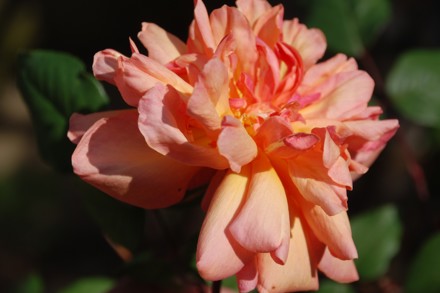
Rosa 'Sou.De Gilbert Nabonnand'
Radiante XIX
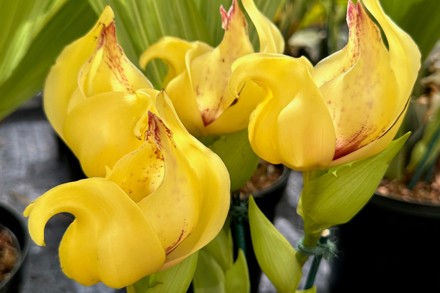
Anguloa
The Mathers Foundation

